Resource Center
The Transit Workforce Center is pleased to host a curated collection of publications and other materials to assist stakeholders engaged in transit workforce development. The Resource Center includes case studies, training materials, research reports, and other materials of interest, including publications produced by federal government agencies, transit organizations, and independent research entities. Resources may be filtered by topic, resource type, and transit mode. This TWC blog post explains how to use the Resource Center.
We are continuing to update the Resource Center regularly. Please contact us via the Request Help menu option if you would like assistance using the Resource Center or are looking for resources on a particular topic. We also welcome suggestions of topics or specific resources to add.
Content in external resources linked from the Resource Center is solely the responsibility of the resource authors and does not necessarily reflect the perspectives of or endorsement by the Transit Workforce Center.
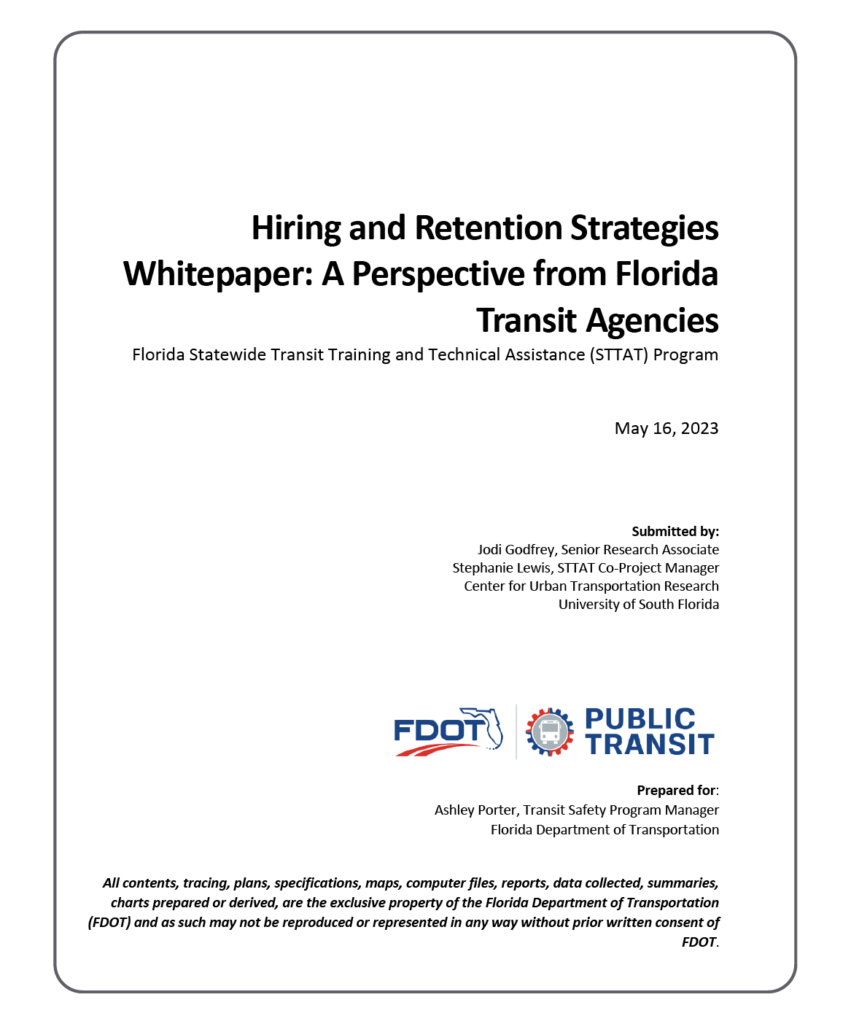
Hiring and Retention Strategies Whitepaper: A Perspective from Florida Transit Agencies
This study examines what transit agencies are doing to address hiring and retention challenges, what strategies are working, and what problems still need to be solved. The report includes six case study sites from Florida transit agencies and one non-Florida transit agency, that were selected due to a variety of characteristics, including partnerships and implemented service changes.
Center for Urban Transportation Research
June 2023
LEARN MORE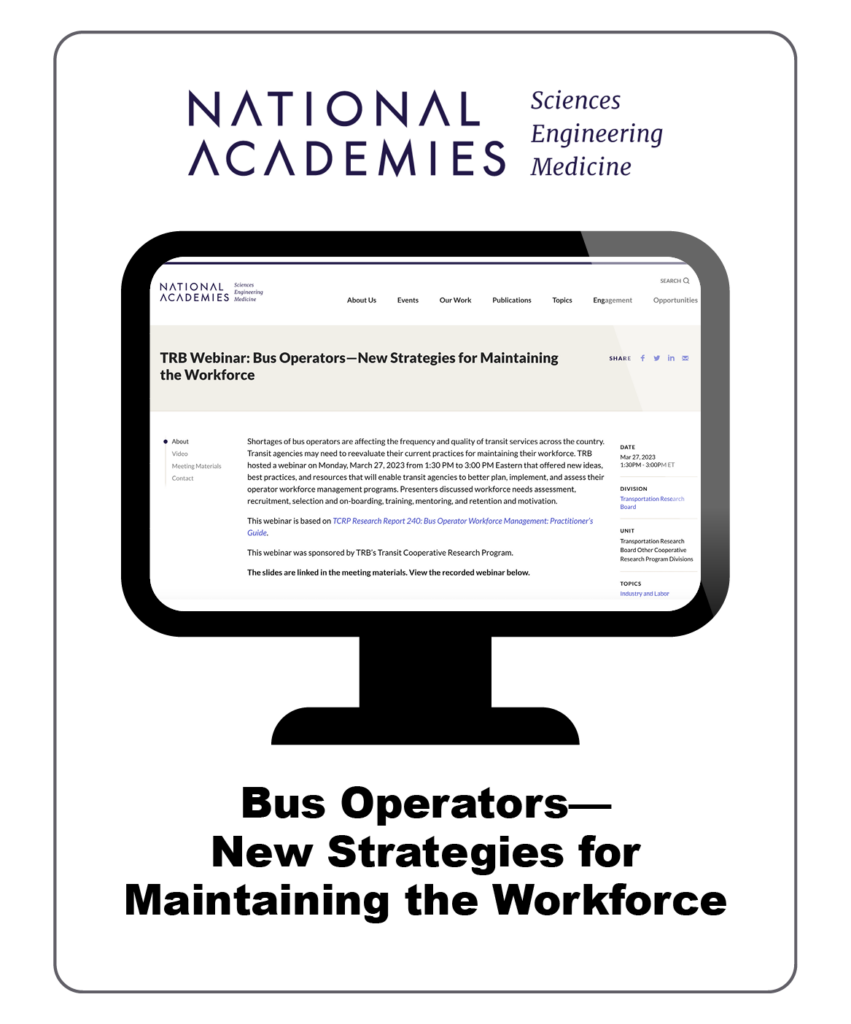
Bus Operators—New Strategies for Maintaining the Workforce
This webinar discusses the ideas, best practices, and resources that will enable transit agencies to better plan, implement, and assess their operator workforce management programs as described in the Bus Operator Workforce Management: Practitioner’s Guide. Presenters discussed workforce needs assessment, recruitment, selection and on-boarding, training, mentoring, and retention and motivation.
Transit Cooperative Research Program
March 2023
TOPICS: Apprenticeship, Hiring and Recruitment, Mentorship, Policy and Planning, Retention, Workforce Shortage
Webinar agenda and presenters
- Bus operator training and retention – Xinge Wang, International Transportation Learning Center
- Lessons from Florida – Trish Collins, Pinellas Suncoast Transit Authority
- Lessons from the Midwest – George F. Fields, Greater Cleveland Regional Transit Authority
- Question and answer session moderated by Robert Puentes, Eno Center for Transportation
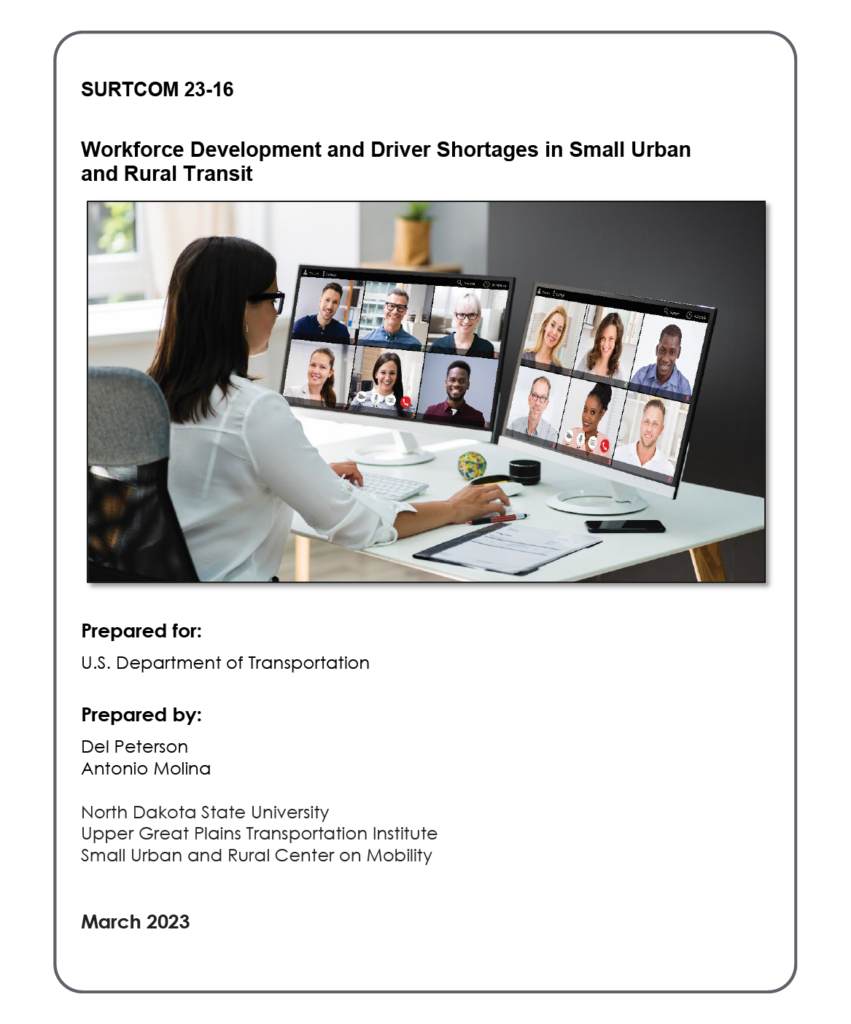
Workforce Development and Driver Shortages in Small Urban and Rural Transit
This report presents a national survey of small urban and rural transit managers to determine current workforce development practices. The survey results outline driver shortages and related issues, including an aging workforce, disruptions in service, and methods of alleviating the shortage.
Small Urban and Rural Center on Mobility
March 2023
LEARN MORE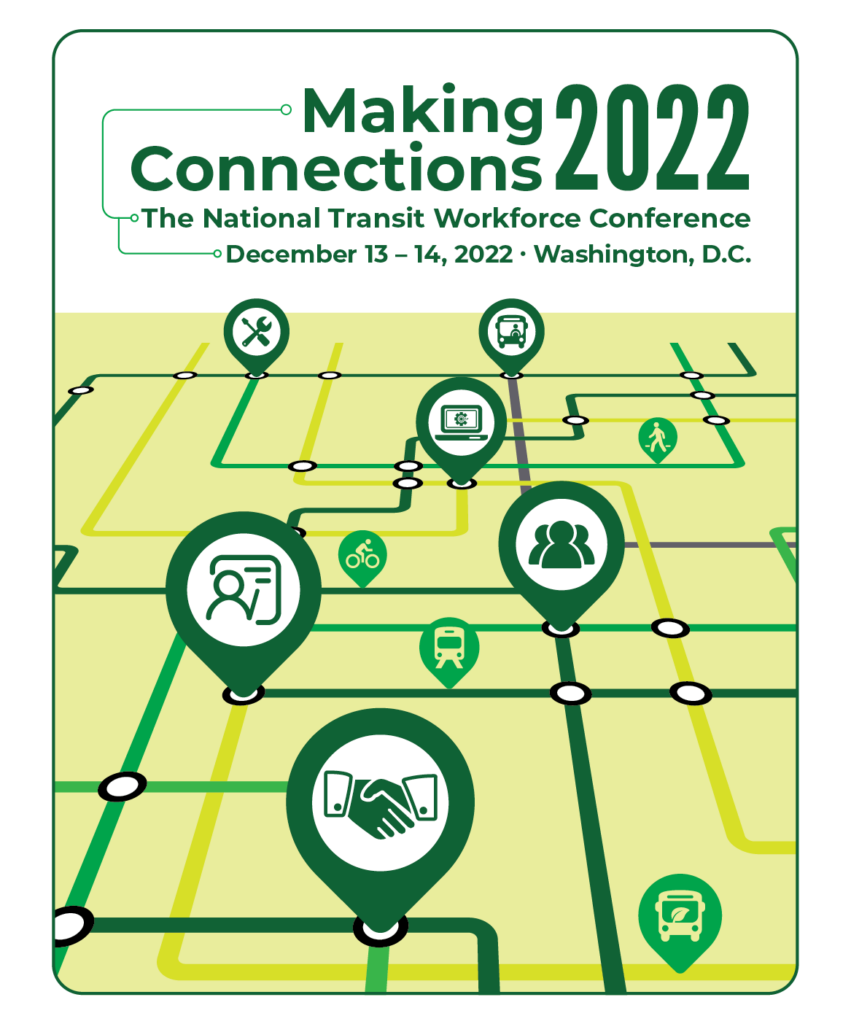
Making Connections 2022 – Driving Bus Operator Recruitment and Retention: Challenges, Opportunities and Innovation
This session about bus operator recruitment and retention was presented as part of TWC’s Making Connections 2022 transit workforce conference in December, 2022.
Transit Workforce Center
December 2022
LEARN MORE
Session Summary: A headline issue confronting all transit systems today – how to attract and retain bus operators in a tight labor market. This lively session began with presentations from the TCRP F-28 research team and TransitCenter on their recently published national research findings on recruiting, developing and retaining transit bus operators. Labor and management industry practitioners from multiple locations then shared their recruitment approaches and strategies that have been most effective on the ground, and TWC staff summarized the National Transit Frontline Worker Recruitment Campaign.
Moderator
- Rob Puentes: President and CEO – The Eno Center for Transportation
Speakers
- Julia Castillo: Executive Director – Heart of Iowa Regional Transit Agency
- James Duff: Assistant Vice President, Human Resources – Dallas Area Rapid Transit
- Jeff Hazen: Executive Director – Sunset Empire Transportation District
- Steve Jovel: Transportation Superintendent – Santa Clara Valley Transportation Authority
- Robin Phillips: Executive Director – National Rural Transit Assistance Program
- Harpreet Singh: JWI Director – Amalgamated Transit Union Local 265
- David Stephen: Senior Communications Specialist – International Transportation Learning Center/Transit Workforce Center
- Chris Van Eyken: Program Manager – TransitCenter
 Driving Bus Operator Recruitment and Retention Session Slides
Driving Bus Operator Recruitment and Retention Session Slides
 ISU Returning Citizens Presentation Slides
ISU Returning Citizens Presentation Slides
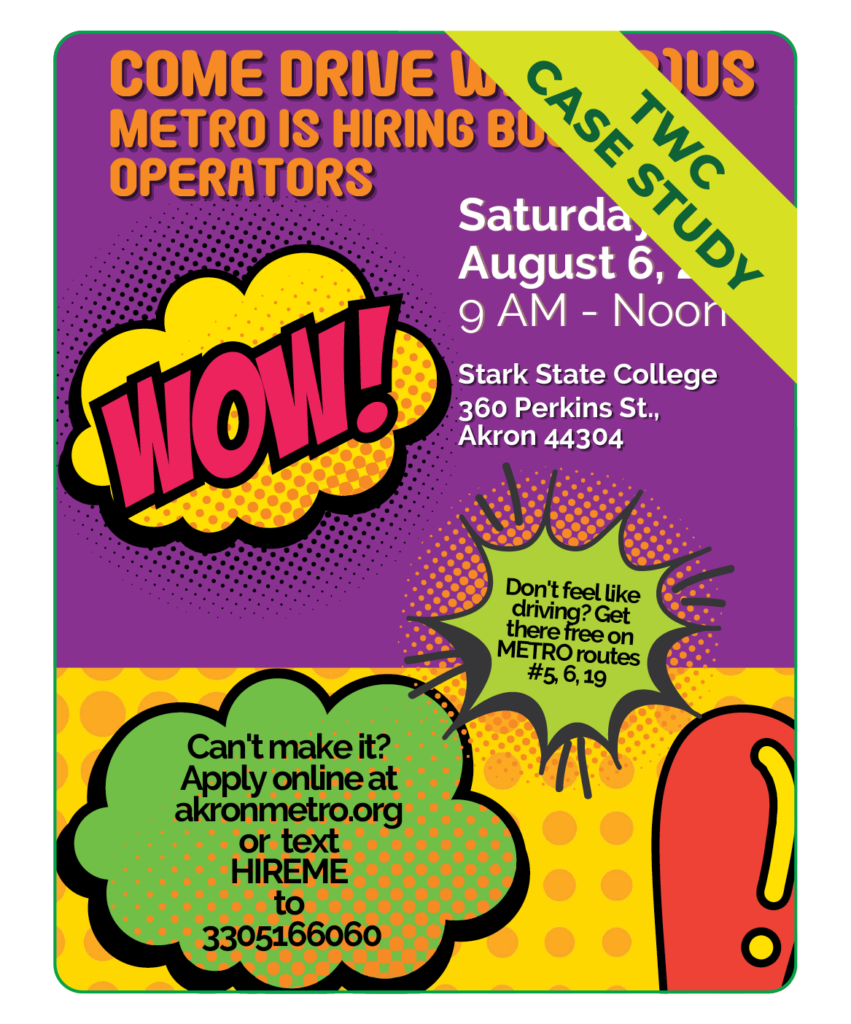
Come Drive with (B)us – Akron METRO Operator Recruitment Event
This TWC mini case study focuses on a recruitment event held by Akron METRO Regional Transit Authority, which could serve as a model for other agencies.
Akron METRO Regional Transit Authority; Transit Workforce Center
September 2022
TOPICS: Hiring and Recruitment
Organizations
Akron METRO Regional Transit Authority (METRO): Transit agency serving Summit County, Ohio and the city of Akron, with a fleet totaling 231 vehicles: 140 large buses and 91 smaller paratransit vehicles. METRO employs 425 team members.
Stark State College: Local event venue and partner in advertising campaign. METRO is currently in the final stages of an agreement with Stark State to supplement its CDL training program.
Program Summary
METRO’s “Come Drive with (B)us” event was a major initiative designed to recruit bus operators. Held at Stark State College, the event featured on-site bus-related activities, interviews and job applications. Extensive outreach activities before the event through multiple outlets, combined with the themed ad campaign, brought 99 interested participants and resulted in 71 contingent offers. The key “draw” to this event was the ability to test drive our vehicles on a closed course alongside our staff. METRO’s idea was that if the thought of driving a bus was keeping people from applying, they could offer a nontraditional mechanism to overcome that hesitancy. Once that challenge was overcome, the process could focus on the soft skills related to empathy and great customer service that are critical to success.
Key Program Elements
- Pre-event publicity
- Pop Art themed ad campaign (viewable on Facebook; an example is attached below as a PDF)
- Free and purchased advertising through social media, including Instagram, Facebook, and Twitter posts
- Information on METRO’s website
- Print ads in local daily and weekly publications
- Two digital billboards, and flyers on buses and posters at METRO’s transit center
- A radio ad on several local radio stations
- Two days before to the event, Stark State College promoted the event on their digital sign, readable from the expressway
- Four radio personalities from four different stations drove the bus two to three weeks prior to the event and promoted on the air, including one station that put together its own video.
- Television interviews that resulted in a full story and a variety of mentions of the event on other stations
- Creating two bus wraps with the pop art feel (see PDF below) on careers, though not event-specific
- Outreach to past applicants
- Videos of three in-house of staff driving for the first time, along with videos featuring County Executive and Representative Casey Weinstein, and an invite video from METRO’s CEO
- Event activities and design (see PDF of signage below)
- Participants were told to bring a valid driver’s license
- Four clearly-marked stations for applicants to go to where they had the opportunity to:
- Apply
- Interview
- Secure a mobility device
- Drive a bus
- Every applicant moved through all four stations
- At final stop, attendees received:
- Bag of information
- Swag
- Digital and paper copies of the CDL training booklet for them to start studying
- Event planning activities
- Started six to eight weeks before event
- Committee was made of HR, Marketing, Operations, Maintenance and Safety/Security
- Eighteen staff members worked the day of the event – five working check-in/applications, five doing on-site interviews, two working the mobility station, five running the “test drive” station, and one runner to move between all stations to relieve backlog
- Used seven 40 foot buses (2 spares) and 2 paratransit vehicles
Outcomes
- Ninety-nine event attendees interviewed and were able to test drive
- Twenty-five additional people applied who could not attend; follow up interviews were planned
- 71 of the 99 were moved through to a “contingent offer” pending background checks with a start date of September 26th
- Twenty-three of the 99 had areas of their application that required reviewing before proceeding
For more information on this event, contact: Jarrod Hampshire – Chief Operations Officer, METRO RTA 330.808.0144
More recruitment advertising materials and resources can be found here.
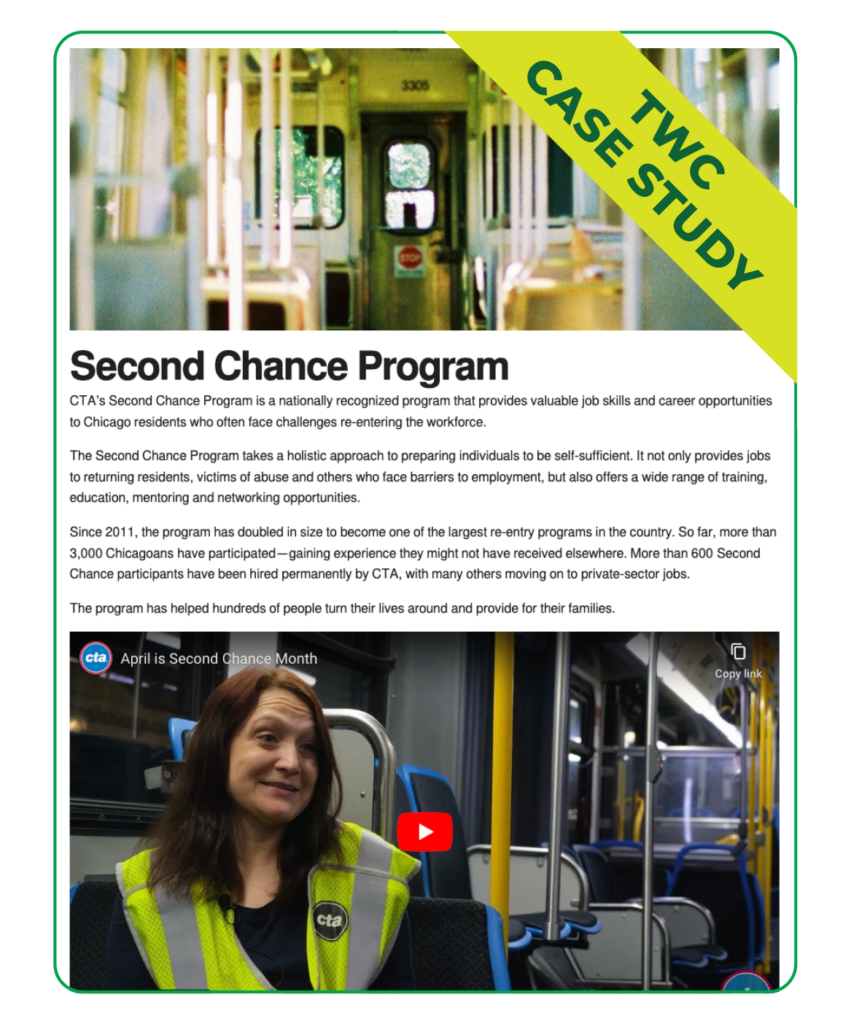
Second Chance Transit Programs
Several transit agencies across the country have established Second Chance programs to support formerly-incarcerated individuals as they reenter the workforce; these programs set pathways into frontline transit positions, often focusing on driver recruitment. These initiatives involve active collaboration between transit agencies and departments of corrections. Agencies have also worked with other partners, including their local unions, state and local workforce development agencies, ex-offender support programs, and local community organizations.
August 2022
LEARN MORE
Basic descriptions of some current state and local programs can be found at the links below.
 Chicago Second Chance Program
Chicago Second Chance Program
 Idaho Second Chance Program
Idaho Second Chance Program
 Indiana Second Chance Program
Indiana Second Chance Program
 Iowa and Oregon Second Chance Program
Iowa and Oregon Second Chance Program
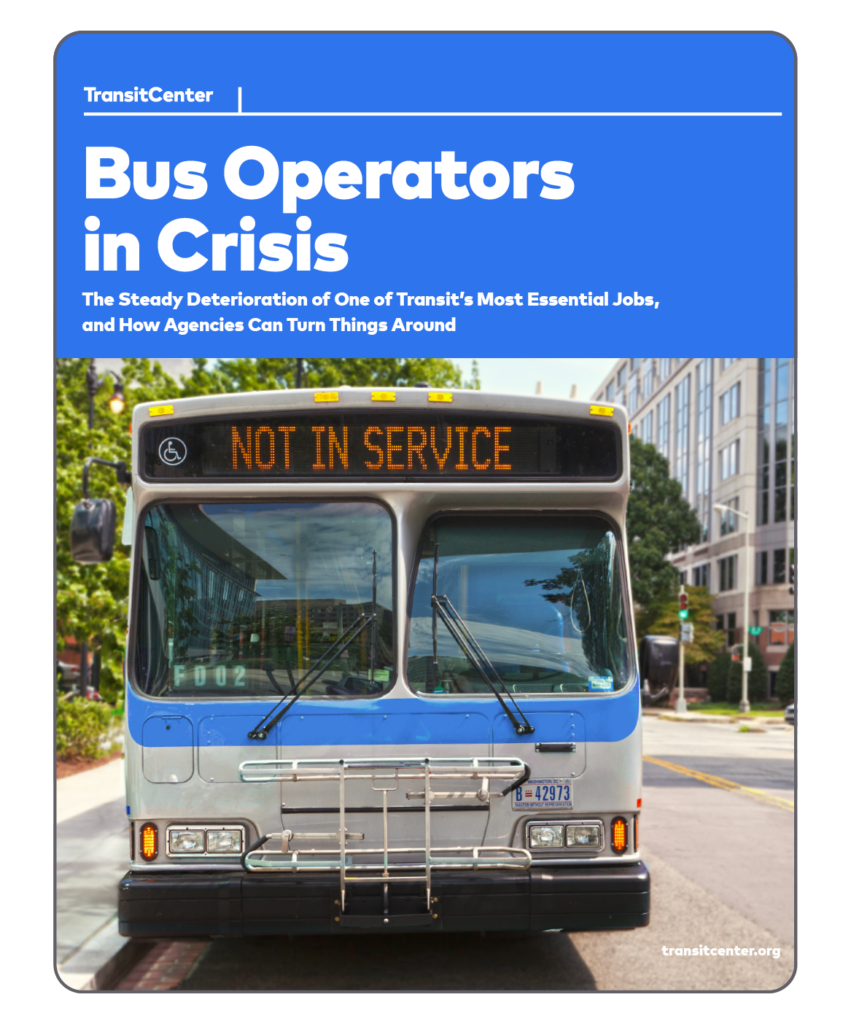
Bus Operators in Crisis
TransitCenter’s report, entitled Bus Operators in Crisis: The Steady Deterioration of One of Transit’s Most Essential Jobs, and How Agencies Can Turn Things Around, analyzes the nationwide phenomenon of bus operator shortages and advocates for enhanced job quality in the occupation.
TransitCenter
July 2022
LEARN MORE
This resource also includes a link to a webinar hosted in July, 2022 presenting information from the report and slides from the webinar.
 Bus Operators in Crisis Webinar Slides
Bus Operators in Crisis Webinar Slides
 Webinar: Operators in Crisis: How Did We Get Here?
Webinar: Operators in Crisis: How Did We Get Here?
 Bus Operators in Crisis Report
Bus Operators in Crisis Report
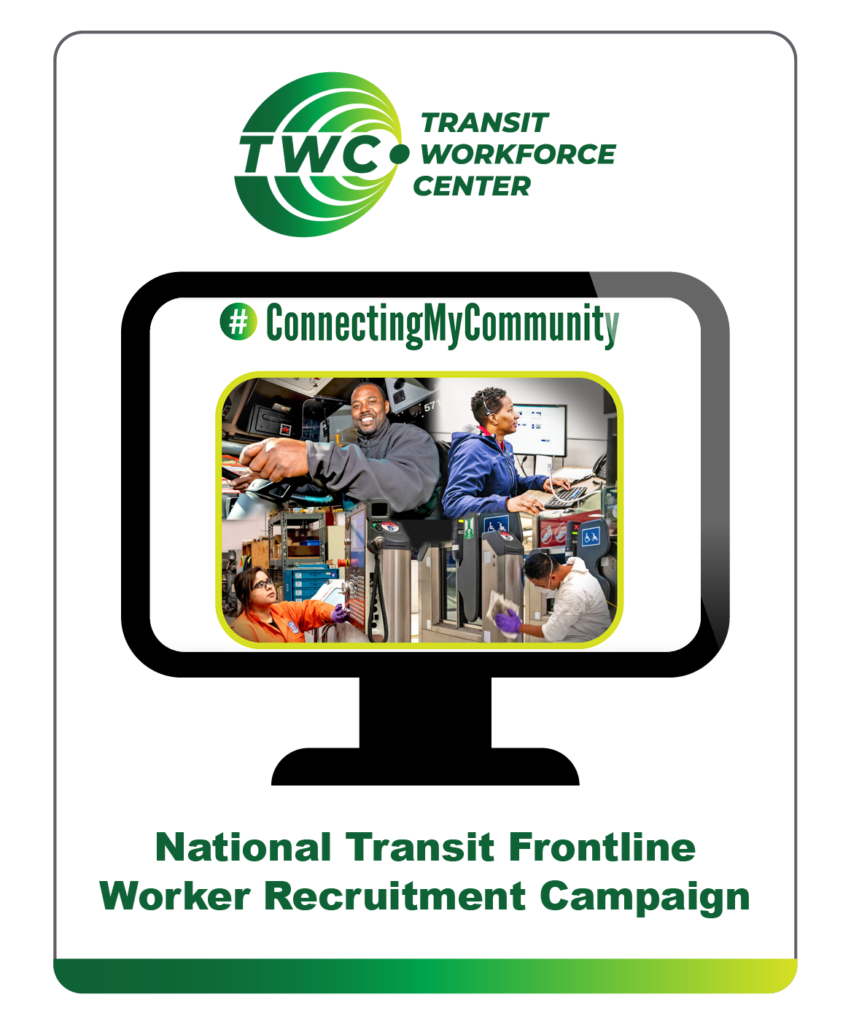
National Transit Frontline Worker Recruitment Campaign
Across the United States, whether large, small, urban, rural, or tribal, transit agencies are facing the challenge of recruiting and retaining drivers, mechanics, and technicians who can operate and maintain the buses of our public transit systems. To help support local transit efforts, TWC is developing the #ConnectingMyCommunity national frontline worker recruitment campaign, coordinated with the Federal Transit Administration (FTA) and industry, labor, and community partners from around the country.
Transit Workforce Center
July 2022
TOPICS: Apprenticeship, Career Pathways, Community Engagement, Hiring and Recruitment, Labor-Management Partnerships, Low-No, Retention, Safety and Health, Trainer and Mentor Development, Training






 CLEAR
CLEAR